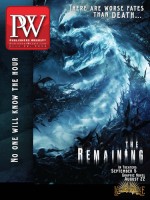Ever since his 1993 memoir, A Safe Place: The True Story of a Father, a Son, a Murder, Lorenzo Carcaterra has dealt with the dark side of life. In the book—his first—he writes about his father, who served prison time for murdering his first wife. Carcaterra once said that when he asked his father if he could write about the murder, the answer was: “If you can make some money, go ahead.”
But what Carcaterra always wanted was to write crime fiction. He read it; he followed its masters, like Elmore Leonard and William Diehl; he hung around with cops—notably Sonny Grasso, the producer of Top Cops (Carcaterra was managing editor of the show throughout its three seasons in the early ’90s); and later he wrote for and produced Law & Order. And he did write those books, filled with cops and criminals and the excitement of meting out justice—all kinds.
This August, Carcaterra pulls out all the stops with his ninth book, The Wolf (Ballantine), in which crime boss Vincent “The Wolf” Marelli brings together the heads of the international crime syndicates in order to get back at the terrorists who murdered his wife and daughters. The premise is that while terrorists are bad for the law abiding, they are also bad for criminals. By making the ensuing battle both professional and personal, Carcaterra runs the gamut of action and emotion.
Carcaterra’s protagonists often operate in teams: Sleepers (1995) is about a group of men who come together to take revenge upon a prison guard who abused them as adolescents. The title was surrounded by controversy when it was released but hit the bestseller lists immediately and was quickly adapted into a film starring Robert De Niro and Brad Pitt. Apaches (1997) features a band of former cops who form a rogue crime-fighting team after a brutal kidnapping. In Gangster (2001), a young man flees his family to find a place in another family—that of the New York mafia. Street Boys (2002) is the story of the gang of children that defended Naples from the Nazis for four days in 1943. Chasers (2006) brings back the renegades from Apaches, while Paradise City (2004) pairs a handsome, sophisticated detective from Naples who is investigating the mob and his female counterpart in N.Y.C. Clearly these novels are crime fiction, with all the tropes of the genre; each book is a page-turner that has been optioned for film. But The Wolf is Carcaterra’s broadest canvas yet.
The genesis of the story, Carcaterra says, is a conversation he had at L.A.’s Mr. Chow Restaurant in 2006. The subject of terrorism came up, and the consensus among his fellow diners was that terrorists “thrive on chaos, whereas most international crime is organized. The terrorists are ‘stepping on the business.’ ” And then came the fateful words: “This should be a book.”
Carcaterra started doing research, gathering information on crime organizations and terrorists around the world. The Wolf opens with a fictional memorandum that lists the major international crime syndicates and provides short bios of their leaders. The list also includes martial artists, green berets, NYPD detectives, and munitions experts. Marelli, the novel’s protagonist, says, “Every top-tier branch of organized crime has joined our union: from the three Italian factions to the Yakuza in Japan, the Triads of China, the French working out of Marseilles, the Algerians, the Israelis, the Greeks, the Irish and the British.... We are now one.... We are a United Nations of crime.” And these are the good guys. On the other side are “the Russian mob, the Mexican crews, and every terrorist outfit on the grid.”
The novel moves around the world, from Florence, Naples, and Rome to Los Angeles, New York, Zurich, Paris, and Toronto. Carcaterra writes what he knows, and where he knows. His parents were from the island of Ischia in Southern Italy, and he still has family there. He grew up in New York and spends time in Italy, which he writes about for National Geographic Traveler magazine.
Ballantine, Carcaterra’s longtime publisher, is solidly behind The Wolf. He says that Gina Centrillo, president and publisher of Random House, told him, “This is the one.” Carcaterra shrugs, saying, “I don’t know.” He’s soft-spoken—especially considering that violence and betrayal are his books’ raisons d’être. He says he had trouble finishing The Wolf, writing it as his wife, journalist Susan Toepfer, was struggling with cancer; she died in December 2013. The book is dedicated to her, and, Carcaterra says she is the one who encouraged him to finish it, editing it for him along the way: “She said it was her favorite.”
The Wolf is the first book in a series. “I never worked from an outline,” Carcaterra says, “but I outlined this book, as well as the two scheduled to follow it.” Book #2 is titled The Witch, and the third is, as yet, unnamed; there could be more. Carcaterra is also working on an original screenplay with Barry Levinson; Gangster is with Joe Roth for a planned eight-hour miniseries; Jerry Bruckheimer has Apaches; and Lorenzo di Bonaventura has optioned The Wolf. There’s talk of an Italian TV series set in Umbria.
But Carcaterra also knows how to slow it down. When he’s not writing crime novels and films, there’s that lake house in Pound Ridge, N.Y., and that bulldog, Gus.



 Volume 261
Issue 30
07/28/2014
Volume 261
Issue 30
07/28/2014





